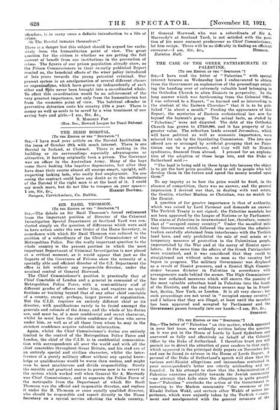SIR BASIL THOMSON. [To THE EDITOR OF THE " SPECTATOR."]
Sus,—The debate on Sir Basil Thomson's forced retirement from the important position of Director of the Criminal Investigation Special Department at Scotland Yard was con- ducted simply on the question of differences which were said to have arisen under the new Order of the Home Secretary, in accordance with which Sir Basil Thomson was reduced to the position of a' subordinate of the Chief Commissioner of the Metropolitan Police. But the really important question to the whole country is the present position in which the most important Department of Criminal Investigation is now placed at a critical moment, as it would appear that just as the Reports of the Governors of Prisons show the necessity of a specially able and efficient director of the C.I. Department the office is left without any responsible director, under the nominal control of General Horwood.
The Chief Commissioner's position is practically that of Chief Constable of London and a general in command of the Metropolitan Police Force, with a semi-military staff of different grades of officers under him, and requires no quali- fications or training beyond that of any other chief constable of a county, except, perhaps, larger powers of organization. But the C.I.D. requires an entirely different chief as its director, with qualifications rarely to be found amongst the generals and colonels of the Army, and the whole of his duties are, and must be, of a most confidential and secret character, whilst he must have the entire confidence of those who serve under him, as well as of all those from whom he may in the strictest confidence acquire valuable information.
Again, whilst the Chief Commissioner's duties are entirely limited to the control of the Metropolitan Police Force and London, the chief of the C.I.D. is in confidential communica- tion with correspondents all over the world and with all the chief constables throughout Great Britain, and his staff are of an entirely special and .civilian character, whilst the inter- ference of a purely military officer without any special know- ledge or qualifications would be worse than useless, and might even be most mischievous and divide responsibility. Surely Use sensible and practical course to pursue now is to revert to the system which worked well when General Sir A. Macready was Chief Commissioner, and to separate the Police Force of the metropolis from the Department of which Sir Basil Thomson was the official and responsible director, and replace it under Sir B. Thomson or some equally qualified director, who should be responsible and report directly to the Home Secretary on a special service affecting the whole country. If General Horwood, who was a subordinate of .Sir. A. Macready's at Scotland Yard, is not satisfied.with the posi- tion of his more eminent predecessor as Chief Commissioner, let him resign. There will be no difficulty in finding an efficient






































 Previous page
Previous page